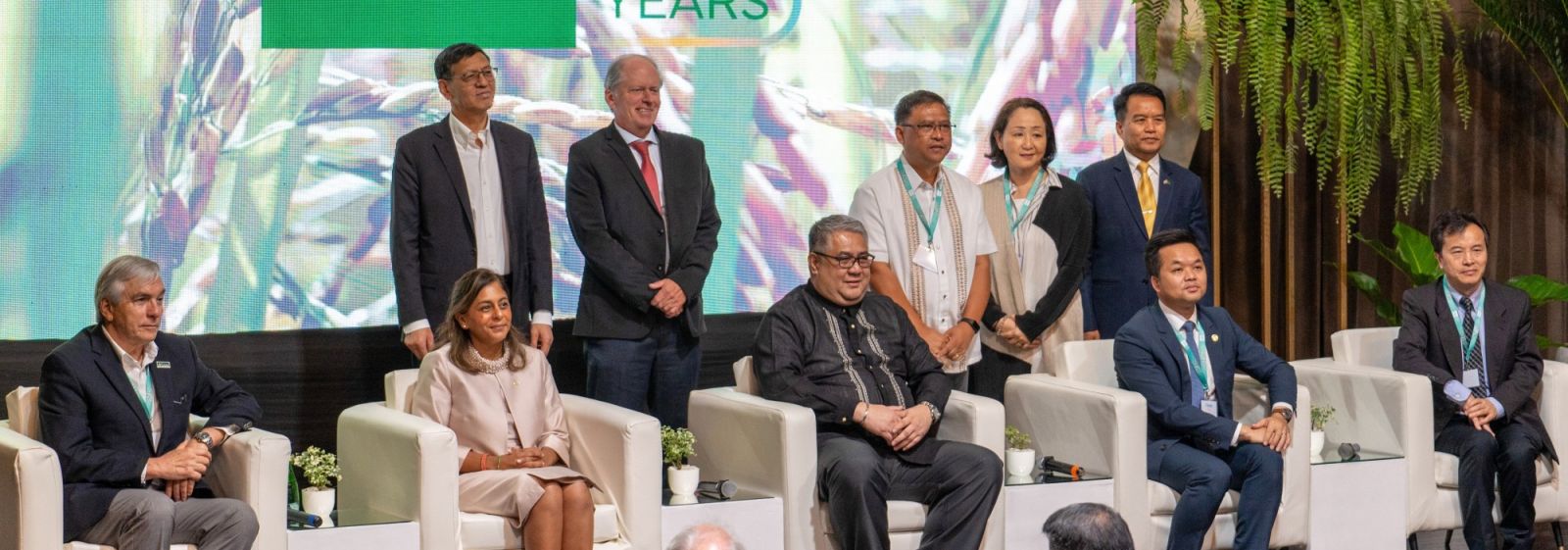IRRI-ADB forum spotlights science, investment, and partnerships for global food system transformation

Bold investments, strategic partnerships, and scalable solutions were at the forefront of the discussions at the “Future of Global Food Systems Forum,” co-hosted by the International Rice Research Institute (IRRI) and the Asian Development Bank (ADB), to accelerate global food systems transformation, particularly for rice.
While rice feeds over four billion people and supports 150 million smallholder farmers globally, its sustainable production remains vulnerable to rising global pressures such as adverse climate change, resource scarcity, food insecurity, and environmental degradation.
Held in celebration of IRRI’s 65th anniversary, the forum gathered global leaders, experts, and government figures to spark conversations on expanding the reach of science-based solutions to confront these challenges.

Scaling up Rice System Solutions
The first panel, moderated by Dr. Ruben G. Echeverria of the Gates Foundation, focused on scaling proven rice technologies powered by research and investment.
Dr. Qingfeng Zhang, Senior Director of ADB’s Agriculture, Food, Nature, and Rural Development Sector Office highlighted the newly launched ADB-CGIAR Clearinghouse Facility as a key platform to expand the adoption of these technologies across developing member countries (DMCs).
The Clearinghouse is co-financed by ADB and the Gates Foundation, with rice as an entry point due to its strong research foundation and importance to global food security.
IRRI Director General Yvonne Pinto elaborated on CGIAR’s role in the platform to support ADB and DMCs as technical expert to ensure that innovations are properly adapted and scaled.
“CGIAR is excellent at providing proof of concept, collecting data that tells us these tried and tested solutions work in specific contexts. But beyond that, they are only one actor in a broader ecosystem,” said Dr. Pinto.
She further encouraged multi-sector cooperation, emphasizing that the private sector, governments, national systems, and access to finance are essential in successfully delivering innovations to farmers.
Government leaders from Cambodia and the Philippines also took the opportunity to share new areas for collaboration and support from IRRI and ADB.
H.E. Khim Finan from Cambodia’s Ministry of Agriculture shared that fragmentation among their nearly two million rice-farming households have slowed the adoption of technologies and sustainable farming practices. In response, the country is establishing modern agricultural cooperatives, where coordinated research support, high-yielding climate-smart rice varieties, and infrastructure financing are needed.
Meanwhile, as one of IRRI’s longstanding partners, Philippine Rice Research Institute (PhilRice) Executive Director Dr. John C. de Leon cited IRRI’s strong support to digital transformation, which enabled the Philippines to project rice supply and demand and develop data-driven policies. “We hope for refreshed strategic efforts among CGIAR, IRRI, ADB, and other entities to ensure that these innovations reach and benefit smallholder farmers,” he remarked.

The Future of Asia’s Rice Sector
CGIAR System Board member and session moderator Dr. Shenggen Fan challenged the panelists from the World Bank, ADB, and Thailand government to share forward-looking approaches to future-proof rice and agri-food systems in Asia.
Dr. Chitnucha Buddhaboon of Thailand’s Ministry of Agriculture expounded their efforts on exploring low-carbon rice cultivation in irrigated areas and promoting high-yield, short-duration varieties to improve water efficiency and reduce production costs. He also sought support for developing value-added rice products and strengthening the financial literacy of rice farmer groups.
During the second panel, Ms. F. Cleo Kawawaki, ADB Director General of the Sectors Department 2, shared that a $1.5 billion investment is already in the pipeline to improve rice productivity and low-carbon rice production across Asia and the Pacific (APAC). She stressed, however, that clear evidence of the benefits the technologies generated, whether financial or impact-driven, is essential in gaining stronger investor support.
Concluding the session, World Bank Group Vice President for Planet, Dr. Juergen Voegele, called for a radical transformation of global food systems to effectively combat climate change. “Farmers need more support than ever. Climate change is hitting them harder. Risk is increasing,” he added.
He noted that the World Bank is actively engaging in dialogues with over 50 countries, managing approximately $9 billion per year dedicated to food systems transformation, focusing on climate resilience and poverty reduction.
In his closing reflection, Dr. Voegele encouraged CGIAR to be a “one-stop window” for agricultural ministries in search of comprehensive, cohesive solutions to meet the complex challenges facing the global food systems.